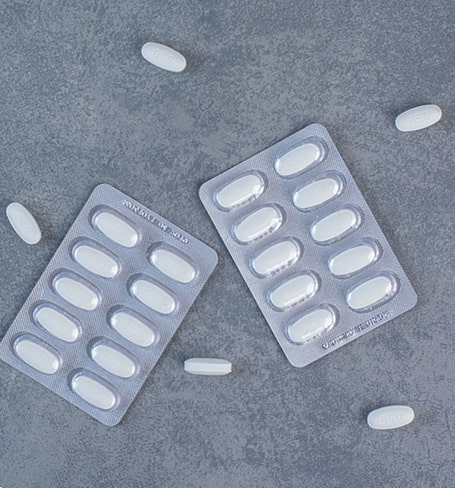Augmentin (Generic Amoxicillin): General Information, Application, and Side Effects
Augmentin is a broad—spectrum antibiotic used to treat viral and bacterial infections of the respiratory and genitourinary tract, bone and soft tissues, skin and dental system, as well as mixed-type infections. The active ingredient of Augmentin is amoxicillin, a drug that inhibits the vital activity of a number of gram—positive and gram-negative bacteria.
Amoxicillin was discovered in 1972, and in 1978 the drug Augmentin was developed on its basis, in which the antibacterial effect of amoxicillin was supplemented by the inclusion of clavulanic acid in the composition — a drug that suppresses the process of acquiring resistance by bacteria to certain groups of antibiotics.

The combination of amoxicillin and clavulanic acid makes it possible to successfully treat complicated infections (even in children) that may arise as a result of irrational antibiotic therapy, as well as to some extent prevent the development of bacterial superinfection: the appearance of highly resistant strains.
Generic Amoxicillin Price Information
There are many reasons why you should consider buying Amoxicillin online from Canadian pharmacies rather than from those in the United States. Firstly, the Augmentin price tends to be much lower in Canada than it is in the United States.
In addition, the quality of generic drugs is just as good in Canada as it is in the United States. Finally, most Canadian pharmacies offer a higher level of customer service than do their American counterparts. When you take all of these factors into account, it is clear that buying augmentin from Canadian pharmacies is the best choice for most consumers, not to mention various discounts, coupons, and a complete 24\7 support.
Advantages of Augmentin
- The bacteriostatic effect of Augmentin significantly exceeds the antibacterial effect of amoxicillin.
- All the shortcomings that were identified in the first generations of amoxicillin-based drugs have been eliminated.
- A wide range of the number of tablets in the package.
Pharmacological properties and purpose of Augmentin
What Augmentin is used for
Augmentin is prescribed for the treatment of clinically confirmed infection with the following types of bacterial pathogens:
- Bacteroides, Corynebacterium, Fusobacteria;
- gonococcus, peptostreptococcus, staphylococcus;
- hemolytic and pyogenic streptococcus;
- E. coli, pertussis and pseudomonas aeruginosa;
- fecal enterococcus;
- salmonella, helicobacter pylori;
- prevotella, citrobacter, enterobacter;
- anthrax bacillus, vibrio cholerae;
- clostridia, listeria monocytogenes, pasteurella multocida;
- borrelia, nocardia;
- Pfeiffer's wand, porphyromonas;
- legionella, eikenella corrodens;
- pale treponema, leptospira, mycoplasma, chlamydia.
How it Works
The mechanism of bacteriostatic action of amoxicillin is based on its ability to actively inhibit the synthesis of the cell wall of bacteria sensitive to this drug. Deprived of their protective shell, bacteria have no chance for survival.
Clavulanic acid inhibits the action of beta-lactamase, a group of special enzymes through which bacteria can destroy certain types of antibiotics, including amoxicillin, thereby acquiring a sufficient degree of resistance to their action. In addition, clavulanic acid stimulates the immune system and has its own antibacterial effect.
The inclusion of clavulanic acid in the composition of Augmentin helps to protect amoxicillin from destruction, which ensures the constancy of its bacteriostatic action.
Who Augmentin is For
Standard Augmentin is prescribed for the treatment of the following infections:
- bronchitis, lobar pneumonia, bronchopneumonia;
- sinusitis, tonsillitis;
- otitis media;
- pyelonephritis, urethritis, cystitis;
- cutaneous staphylococcus, erysipelas of the skin;
- gonorrhea, chlamydia.

Augmentin can also be used to treat rarer pathologies: lymphangitis, listeriosis, nocardiosis, osteomyelitis, postpartum sepsis, etc.
Recommendations for using Augmentin
Method of application and dosage
The drug is taken one tablet 250/125 mg or 500/125 mg 3 times a day or one tablet 875/125 mg twice a day — without chewing, immediately before meals, at regular intervals. The minimum recommended course of treatment is 5 days.
For the treatment of children, the optimal daily dosage of Augmentin is selected individually, taking into account the child's body weight.
The regimen and daily dosage of the drug may vary by the decision of the attending physician based on the severity and nature of the disease, as well as the age and general condition of the patient.
Common Doses
Common doses of Augmentin include the following volumes:
- Augmentin 250 mg
- Augmentin 500 mg
- Augmentin 875 mg
Contraindications
- Severe liver diseases, especially in the presence of jaundice.
- Kidney diseases accompanied by a decrease in the level of Cl creatinine in the blood.
- Individual intolerance to amoxicillin and/or clavulanic acid.
Side Effects
Nausea, vomiting, diarrhea, headaches, dizziness, insomnia, anxiety, hyperexcitability, colitis, stomatitis, erythema, candidiasis, skin rash and/ or itching, angioedema, allergic vasculitis, reversible changes in blood biochemical parameters may occur with a probability of > 1%.
Overdose
Exceeding the recommended daily dosage can provoke gastrointestinal dysfunction and seizures. Those with kidney diseases rarely develop renal failure.
Treatment: correction of water-electrolyte balance and symptomatic therapy. In severe conditions, hemodialysis is recommended.
Interaction with other drugs
It is strictly forbidden to take Augmentin at the same time as Probenecid due to the high risk of an increase in the concentration of amoxicillin in the blood while maintaining the previous indicators of clavulanic acid.
Augmentin Is also not recommended to combine with the following drugs:
- Allopurinol: due to the likelihood of dermatological allergies.
- Acenocumarol, warfarin: due to the ability of Augmentin in rare cases to enhance the anticoagulant effect of drugs.
- Hormonal contraceptives: Augmentin prevents the absorption of estrogen in the gastrointestinal tract, which causes a decrease in the contraceptive effect of oral contraceptives.
Special instructions and precautions
- Taking Augmentin before eating significantly reduces the likelihood of side effects from the gastrointestinal tract.
- It is not recommended to take Augmentin for longer than 14 days in order to avoid the development of addiction of bacterial pathogens to the action of the drug.
- Patients who attend hemodialysis need individual dosing of the drug and constant monitoring of the course of treatment.
- In severe forms of infection and previous antibiotic therapy, it is advisable to pre-analyze the sensitivity of pathogens to Augmentin.
- During the course of Augmentin treatment, it is recommended to pay special attention to the regularity and thoroughness of brushing teeth in order to avoid staining the enamel surface.
FAQ

Will 2 tablets of Augmentin 250 mg and 125 mg replace one 500/125 mg tablet?
No, these are not equivalent dosages. It is necessary to take only the form of the drug prescribed by the attending physician.
Is Augmentin compatible with alcohol?
No. All antibiotics, including Augmentin, are completely incompatible with alcohol.
Is it possible to take Augmentin during pregnancy?
Only in cases where the intended benefit of the drug significantly exceeds the possible negative effect on the embryo, since the drug is able to penetrate the placental barrier. These risks should only be assessed by your healthcare specialist.
Does Augmentin help against COVID-19?
No. Augmentin is not meant for the treatment of COVID-19.
What should I do if I missed the dose?
Immediately take the missed dose of the drug, and take the next dose after an appropriate period of time (8-12 hours). Do not take a double dosage — this can cause overdose symptoms and increase the rate of development of resistance of the pathogen to Augmentin.




